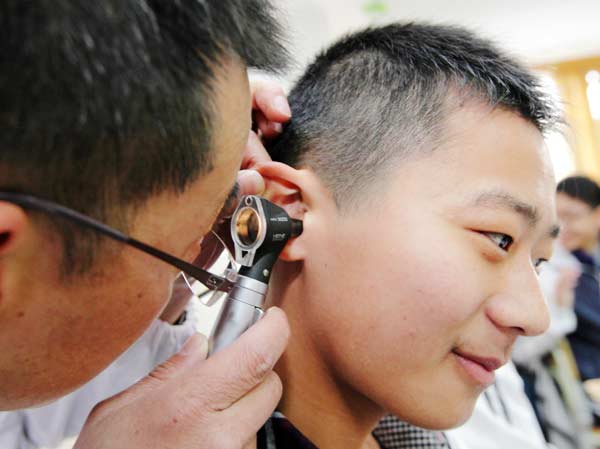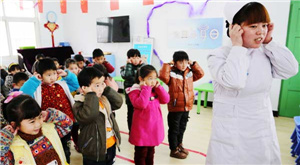Fading sound
China Daily, March 6, 2014 Adjust font size:
|
Doctors offer free checkups for schoolchildren and educate them about ear and hearing health in Shaoxing, Zhejiang province. [Photo by Luo Shanxin / for China Daily] |
Half of all hearing-loss cases are avoidable through primary prevention, according to a World Health Organization report. Liu Zhihua finds out the details.
Beijing resident Liu Wen almost fainted when the doctor informed her that her 5-year-old daughter Zhang Shiwen had profound hearing loss.
"I knew she might have some problem with her hearing, but it had never occurred to me the problem would be so severe," Liu says. "Doctors said even a train whistle would sound vague to her."
Zhang is one of the 2.78 million hearing loss sufferers in China. Of the figure, 137,000 are children under 6, according to government statistics. Some 23,000 newborns in the country annually suffer from hearing loss.
The girl was born healthy and cleared the newborn hearing test and other genetic diseases scans. The family doesn't have a hearing-loss history, so the diagnosis came as a shock.
Struggling to accept the reality, Liu took her daughter to various hospitals, which all concluded Zhang had neural hearing loss, but failed to give clear identification of the cause.
Liu says she believes the condition is not congenital, because the little girl had learned to speak before she became hearing impaired.
She recalls in 2012, Zhang had chronic colds and fever, developed sinusitis and took lots of medication. She also regrets not paying much attention when Zhang seemed unwilling to speak at times and when she suddenly performed poorly in kindergarten.
"It is hard to trace the causes of hearing loss in a child, because many factors contribute to that," says Gu Qing-long, an ear, nose and throat specialist with the Capital Institute of Pediatrics.



